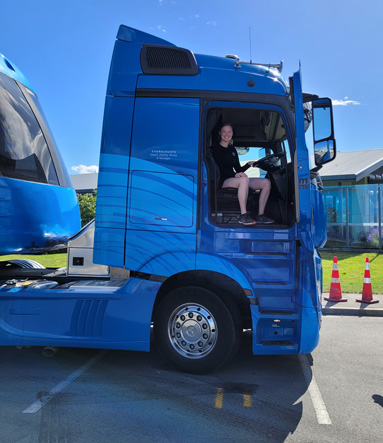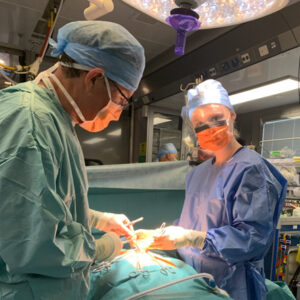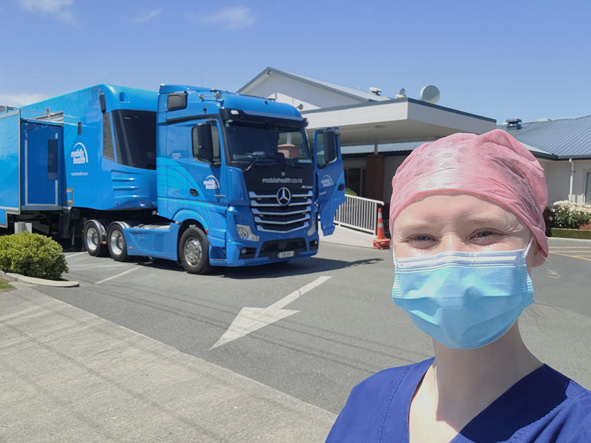(Pictured above: Lizzie Stevenson on her last day on the surgical unit. “The unit is parked in the same location in Balclutha as when I saw it for the first time!” she says).
As a medical student, gaining practical experience is an integral part of the learning process. Lizzie Stevenson , a medical student from Christchurch, worked on the Mobile Surgical Unit – Te Waka Hauora for four weeks during November and December 2022 as part of her final year at Otago Medical School elective placement. Working on the surgical unit allowed her to travel across the country, moving to a different location each day to provide care to patients in need of surgery, beginning her journey in the south from Clyde all the way up to Taumaranui in the north.
During her month-long stint on the unit, she gained valuable insights into the various aspects of rural medicine, as well as surgical and anaesthetic care. She describes her experience as fun, full-on, eye-opening and life changing; and found each aspect of the experience to be rewarding as it allowed her to gain a deeper understanding of the surgical process and the challenges that come with providing care to patients. The experience has also taught her important skills and lessons that will be invaluable to her as she continues her medical training and embarks on her career as a medical professional.
With first-hand experience under her belt, she says “This experience made me consider so many things in my life – not only in terms of helping inspire me towards particular specialties of medicine I might like to pursue in future, but also the importance of providing equitable access to health in rural communities. It also helped me to actually reflect on my own life as a farmer’s daughter in rural North Canterbury, and how fortunate I am to have been brought up in a loving, health-conscious family, to go to school, to have unquestionable access to dental and health care, and to be able to study medicine.
“It helped to bring clarity to the reason why I am studying what I am and inspire me to be the best doctor I can be, so that I can ultimately give back to some of the communities we visited on the surgical unit who perhaps were not born into such dumb luck that I was.”
Mobile Health clinical staff Chris Heath, anaesthetic technician and Karenza Heath, clinical nurse leader, are a husband and wife duo who have worked on the surgical unit since its inception. They took Lizzie under their wing and committed themselves to providing her with a valuable educational experience while ensuring she was well looked after. They showed Lizzie how to properly perform tasks and then supervised her as she performed them herself. The friendly clinical team made sure she understood the steps involved, answered any questions she had, and made sure she felt supported and confident in her abilities, whilst also having a lot of fun – something for which she is incredibly grateful, and can’t thank the Mobile Health family enough.
 Lizzie says she enjoyed every angle of patient care, including admitting, assessing and assisting with operating and recovery, as well as practising practical skills on a daily basis such as cannulation, intubation, managing airways and helping to navigate the anaesthetic machine. One aspect of the experience that stood out for her was her exposure to anaesthetics and plans to possibly explore this specialty further.
Lizzie says she enjoyed every angle of patient care, including admitting, assessing and assisting with operating and recovery, as well as practising practical skills on a daily basis such as cannulation, intubation, managing airways and helping to navigate the anaesthetic machine. One aspect of the experience that stood out for her was her exposure to anaesthetics and plans to possibly explore this specialty further.
Despite the challenge of adjusting to new locations and teams each day, and the tiredness that travel brings, she wouldn’t have it any other way. “Regardless of where I went and what group of people I was working with during the month on the road, I felt valued as a team member and was generously given so many opportunities to learn from these expert people who love their job – it was an inspiring environment to be part of!”
The surgical unit isn’t unfamiliar to Lizzie (pictured right: Sat in the front of the surgical unit, parked in her home town of Rangiora), as she had seen the surgical unit parked up during her trip to Balclutha in 2019 and 2020 as part of a Rural Medicine student interest group. Learning about how the service works and being inspired, she took a tour through the unit at the time. Additionally, another connection to the unit came from her older sister who is a third-year junior doctor in Nelson, who had planned to join the team in 2020 for her placement before COVID-19 hit and unfortunately was unable to participate. “It was a true highlight when I meet up with her at the mobile surgical unit in Motueka on her day off from Nelson Emergency Department! It is very seldom that family members end up working together in medicine, so it was very special to have two sisters working together in a surgical theatre, in a bus, in the middle of a carpark, in Motueka!”
Ultimately, the success of the clinical team depends on their ability to work together effectively. By collaborating and supporting one another, they are able to provide the highest quality care to their patients. These clinicians come from a variety of different backgrounds and specialties, but they all share a common goal: to help their patients live healthy, fulfilling lives. “Something else that surprised me was the incredible work ethic of the team working on the surgical unit, and their ability to create a working environment that was fun, efficient and incredibly successful. I think part of the success of this team is the fact that everyone just gets on and does everything to help everyone out. There is absolutely no hierarchy within the theatre; when needed, every person is happy to just get stuck in and help with each other’s tasks in order to make things run smoothly, regardless of their role. This was a contrast to the way that I have experienced working in a hospital theatre, where people have their very segregated roles, responsibilities and hierarchies, and they often just stick to what they are paid to do, without the generosity of sharing the load to help everyone out. The surgical unit was an incredible place to work and learn in, and is in a class of its own,” she says.
 The surgical unit has a significant impact on providing access to health care for patients in remote and rural areas, and Lizzie’s story highlights the importance of gaining practical experience in the medical field. “The principles learnt through working in rural communities, the skills developed through getting stuck in and working in a team, and learning about how to be helpful in any way possible (whether that be cleaning up after a patient surgery, helping X-ray patients, scrubbing in, helping with cannulations or intubations, helping admit patients, cooking pikelets for morning tea, comforting a crying patient, working as a dental assistant or packing up the truck before heading off after a day’s work) is beyond invaluable. I am so grateful to each and every person who helped make this incredible experience possible. It has truly been the highlight of my medical career so far, and I want to thank the Mobile Health team for everything you did to help me learn and make me feel part of your special whānau. In future, I would love to return to the MSU in some capacity and contribute to this incredible service and the people whose lives are positively impacted by it!
The surgical unit has a significant impact on providing access to health care for patients in remote and rural areas, and Lizzie’s story highlights the importance of gaining practical experience in the medical field. “The principles learnt through working in rural communities, the skills developed through getting stuck in and working in a team, and learning about how to be helpful in any way possible (whether that be cleaning up after a patient surgery, helping X-ray patients, scrubbing in, helping with cannulations or intubations, helping admit patients, cooking pikelets for morning tea, comforting a crying patient, working as a dental assistant or packing up the truck before heading off after a day’s work) is beyond invaluable. I am so grateful to each and every person who helped make this incredible experience possible. It has truly been the highlight of my medical career so far, and I want to thank the Mobile Health team for everything you did to help me learn and make me feel part of your special whānau. In future, I would love to return to the MSU in some capacity and contribute to this incredible service and the people whose lives are positively impacted by it!
“As someone who loves communicating with my fellow medical students especially through working as president of our Christchurch Medical Students’ Association this year, I have already sung the praises of working on the mobile surgical unit to many in our student cohort – I predict there will be many who are very keen to pursue this uniquely superb learning experience in future!”
(Pictured left above: Lizzie assisting with an umbilical hernia in Motueka with Mr Alf Deacon)

